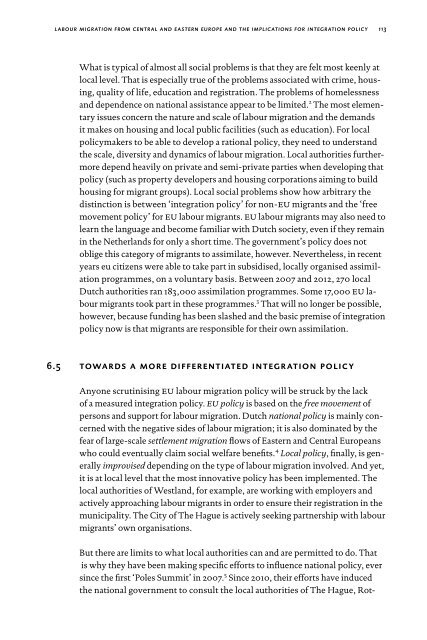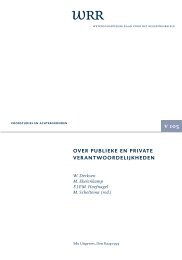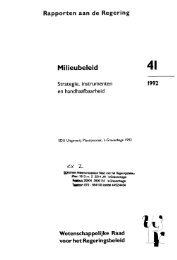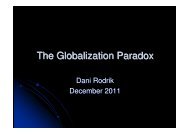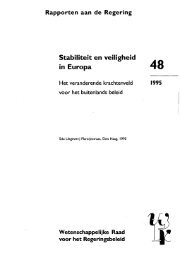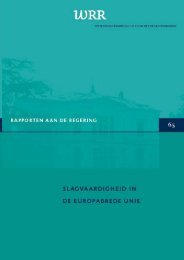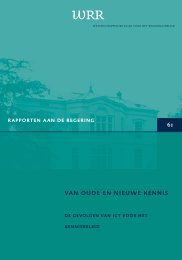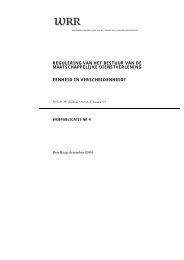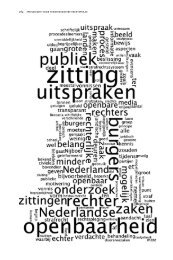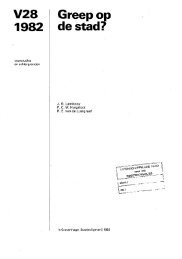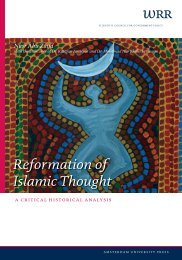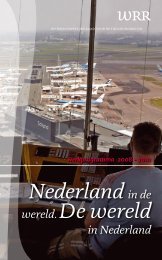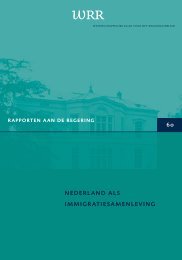Making Migration Work - Wetenschappelijke Raad voor het ...
Making Migration Work - Wetenschappelijke Raad voor het ...
Making Migration Work - Wetenschappelijke Raad voor het ...
- No tags were found...
You also want an ePaper? Increase the reach of your titles
YUMPU automatically turns print PDFs into web optimized ePapers that Google loves.
labour migration from central and eastern europe and the implications for integration policy113What is typical of almost all social problems is that they are felt most keenly atlocal level. That is especially true of the problems associated with crime, housing,quality of life, education and registration. The problems of homelessnessand dependence on national assistance appear to be limited. 2 The most elementaryissues concern the nature and scale of labour migration and the demandsit makes on housing and local public facilities (such as education). For localpolicymakers to be able to develop a rational policy, they need to understandthe scale, diversity and dynamics of labour migration. Local authorities furthermoredepend heavily on private and semi-private parties when developing thatpolicy (such as property developers and housing corporations aiming to buildhousing for migrant groups). Local social problems show how arbitrary thedistinction is between ‘integration policy’ for non-eu migrants and the ‘freemovement policy’ for eu labour migrants. eu labour migrants may also need tolearn the language and become familiar with Dutch society, even if they remainin the Netherlands for only a short time. The government’s policy does notoblige this category of migrants to assimilate, however. Nevertheless, in recentyears eu citizens were able to take part in subsidised, locally organised assimilationprogrammes, on a voluntary basis. Between 2007 and 2012, 270 localDutch authorities ran 183,000 assimilation programmes. Some 17,000 eu labourmigrants took part in these programmes. 3 That will no longer be possible,however, because funding has been slashed and the basic premise of integrationpolicy now is that migrants are responsible for their own assimilation.6.5 towards a more differentiated integration policyAnyone scrutinising eu labour migration policy will be struck by the lackof a measured integration policy. eu policy is based on the free movement ofpersons and support for labour migration. Dutch national policy is mainly concernedwith the negative sides of labour migration; it is also dominated by thefear of large-scale settlement migration flows of Eastern and Central Europeanswho could eventually claim social welfare benefits. 4 Local policy, finally, is generallyimprovised depending on the type of labour migration involved. And yet,it is at local level that the most innovative policy has been implemented. Thelocal authorities of Westland, for example, are working with employers andactively approaching labour migrants in order to ensure their registration in themunicipality. The City of The Hague is actively seeking partnership with labourmigrants’ own organisations.But there are limits to what local authorities can and are permitted to do. Thatis why they have been making specific efforts to influence national policy, eversince the first ‘Poles Summit’ in 2007. 5 Since 2010, their efforts have inducedthe national government to consult the local authorities of The Hague, Rot -


